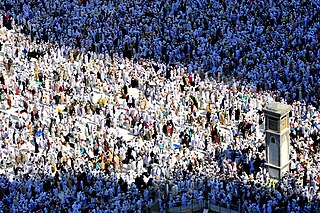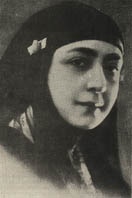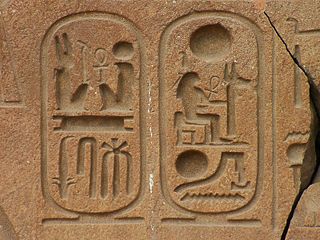This page is based on this
Wikipedia article Text is available under the
CC BY-SA 4.0 license; additional terms may apply.
Images, videos and audio are available under their respective licenses.
Arabic names were historically based on a long naming system; most Arabs did not have given/middle/family names, but a full chain of names. This system is mainly in use throughout the Arab world.
A personal name or full name is the set of names by which an individual is known and that can be recited as a word-group, with the understanding that, taken together, they all relate to that one individual. In many cultures, the term is synonymous with the birth name or legal name of the individual. The academic study of personal names is called anthroponymy.
A Persian name consists of a given name, sometimes more than one, and a surname.
Huda Salih Mahdi Ammash is an Iraqi scientist, dubbed Mrs. Anthrax and Chemical Sally by the Western press for her association with the Iraqi biological weapons program. Ammash was number 53 on the Pentagon's list of the 55 most wanted, the five of hearts in the deck of Most wanted Iraqi playing cards, and the only woman to be featured.

Hajji (الحجّي) is a title which is originally given to a Muslim person who has successfully completed the Hajj to Mecca. It is also often used to refer to an elder, since it can take time to accumulate the wealth to fund the travel, and in many Muslim societies as an honorific title for a respected man. The title is placed before a person's name; for example Joshua Omo becomes Hajji Joshua Omo.
Indonesian names and naming customs reflect the multicultural and polyglot nature of the over 17,000 islands in the Indonesian archipelago. The world's fourth most populous nation, Indonesia is home to approximately 365 tribal-ethnic groups, each with their own culture, customs, and language. The state officially recognises more than 300 of these ethnic groups. The Javanese are the largest single group, comprising around 40 percent of Indonesia's population.
Javanese people have various systems for naming. Some Javanese, especially those from older generations, have only one name and no surname. Others use their father's names as well as their own, in a similar manner to European patronymics. For example, Abdurrahman Wahid's name is derived from Wahid Hasyim, his father, an independence fighter and minister. In turn, Wahid Hasyim's name was derived from his father named Hasyim Asyari, a cleric and founder of the Nahdlatul Ulama organization. Another example is former president Megawati Sukarnoputri; the last part of the name is a patronymic, meaning "Sukarno's daughter".
Personal names in Malaysia vary greatly according to ethno-cultural group. Personal names are, to a certain degree, regulated by the national registration department, especially since the introduction of the National Registration Identity Card (NRIC).
Huda al-Attas is a Southern Yemeni journalist and author. She was born in 1971 in Dawʿan in the Hadhramaut. She is best known for her short stories, for which she has won a number of awards, including the Al-Afif prize in 1997. Her first collection of stories hājis rūḥ wa hājis jasad was published in Aden in 1995. Since then she has published two more collections.
Huda Ben Amer is a former Libyan politician. A follower of the Libyan ruler, Colonel Muammar Gaddafi, she was the Secretary of the General People's Congress of Inspection People's Control and mayor of Benghazi until the Libyan Civil War.

Huda Sha'arawi was a pioneering Egyptian feminist leader, nationalist, and founder of the Egyptian Feminist Union.
Huda Naccache is an Arab-Israeli model. She was the first Arab (Christian) model to appear on the cover of an Arabic language magazine in a bikini and was Israel's representative to the Miss Earth beauty pageant in Philippines in December 2011.
Alhadeff is a Sephardic surname of Arabic and then Spanish-Moorish origin which is found most often among the Eastern Sephardim who left Spain before 1492 to settle in the Eastern Mediterranean region, especially on the Greek island of Rhodes.
Variations of this surname include Alhadef and Alhadahef.

Houda Darwish is an Algerian novelist, poet, writer, and women's rights activist. According to Abdel Madjid Djaber, a Palestinian critic and academician, she is a "charming lady of Algerian literature.".

Huda Hussein, also known as Al-Malika, is a Kuwaiti actress and producer.
Huda Otoum, or Huda Etoom, is a Jordanian politician, and member of Jordan's Muslim Brotherhood, and its political arm the Islamic Action Front party.
Huda Sajjad Mahmoud Shaker, is an Iraqi politician from Najaf Governorate. She holds a bachelor's degree in chemistry.. She served as a member of the Council of Representatives for the governorate of Qadisiyah in its second session (2010-2014) and the third session (2014-2018) for State of Law Coalition inside Islamic Dawa Party. On 2016 was accused of extorting public officials to obtain money.






